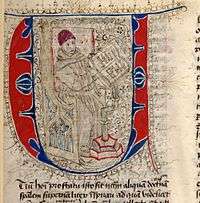Formal distinction
In scholastic metaphysics, a formal distinction is a distinction intermediate between what is merely conceptual, and what is fully real or mind-independent. It was made by some realist philosophers of the Scholastic period in the thirteenth century, and particularly by Duns Scotus.
| Part of a series on |
| John Duns Scotus |
|---|
 |
|
Scholasticism Univocity Haecceity Immaculate conception Beatific vision Formal distinction Hylomorphism Scotistic realism Substance theory (ousia) Accident Substantial form Quiddity (essence / nature) Individuation Existence of God Christology Dunce cap Platonic realism Categories (Aristotle) Problem of universals Metaphysics Christianity and slavery |
|
Works Opus Oxoniense Tractatus de Primo Principio Quaestiones Quodlibetales |
|
Influences Aristotle ("The Philosopher") St. Paul ("The Apostle") Pseudo-Dionysius St. Augustine ("The Theologian") St. Boethius Avicenna Peter Lombard ("The Master") Averroes ("The Commentator") Maimonides ("Rabbi Moses") St. Albertus Magnus ("The Universal Doctor") St. Thomas Aquinas ("The Angelic Doctor") |
|
Related Aristotelianism Franciscan Order Oxford University Catholic theology List of Franciscan theologians Empiricism |
|
|
Background
Many realist philosophers of the period (such as Aquinas and Henry of Ghent), recognised the need for an intermediate distinction that was not merely conceptual, but not fully real or mind-independent either. Aquinas held that the difference between our concepts arises not just in the mind, but has a foundation in the thing (fundamentum in re). Henry held that there was an 'intentional' distinction (distinctio intentionalis) such that 'intentions' (i.e. concepts) that are distinct in the mind, correspond to things which are potentially distinct in reality.
Scotus argued for a formal distinction (distinctio formalis a parte rei), which holds between entities which are inseparable and indistinct in reality, but whose definitions are not identical. For example, the personal properties of the Trinity are formally distinct from the Divine essence. Similarly, the distinction between the 'thisness' or haecceity of a thing and its existence is intermediate between a real and a conceptual distinction.[1] There is also a formal distinction between the divine attributes and the powers of the soul.
Ockham was opposed to the idea, arguing that whenever there is any distinction or non-identity in reality, then two contradictory statements can be made. But contradictory statements cannot be truly asserted unless the realities they stand for are either (1) distinct real things (2) distinct concepts or (3) a thing and a concept. But if they all exist in reality, they are not distinct concepts, nor are they a real thing and a concept. Therefore, they are distinct in reality.[2]
Notes
- Honderich p. 209
- Ockham, Ordinatio I. i. q1.
References
- Gracia, J.E. & Noone, T., A Companion to Philosophy in the Middle Ages, Blackwell 2003.
- Grenz, Stanley J., The Named God And The Question Of Being: A Trinitarian Theo-ontology, Blackwell 2005.
- "The Death of Blessed Scotus", article written by Canon Joseph Bonello and Eman Bonnici.
- Honderich, T., (ed.) The Oxford Companion to Philosophy, article "Duns Scotus", Oxford 1995.
- Ingham, M.B., & Mechthild Dreyer, The Philosophical Vision of John Duns Scotus: An Introduction. Washington DC: Catholic University of America Press 2004.
- Kretzmann, N., A. Kenny, & J. Pinborg, Cambridge History of Later Medieval Philosophy Cambridge: 1982.
- Vos., A. The Philosophy of John Duns Scotus. Edinburgh: Edinburgh University Press, 2006.
- Williams, Thomas, (ed.), The Cambridge Companion to Duns Scotus. Cambridge University Press 2003.